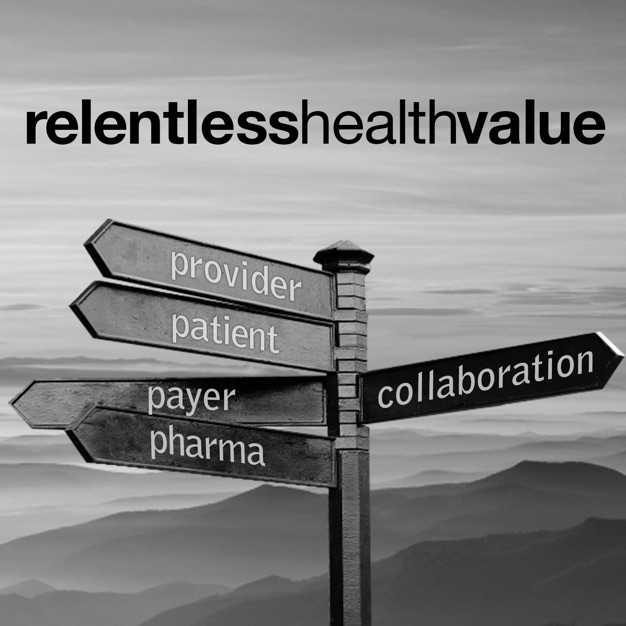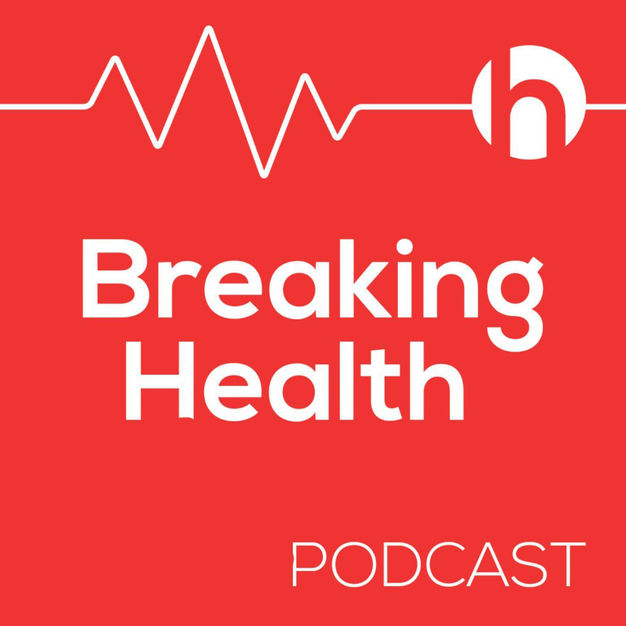
Relentless Health Value
Stacey Richter
Relentless Health Value is the podcast for business leaders working in payer/insurance carrier and provider organizations, as well as for pharmaceutical, medical device, patient advocacy, and other health care organizations. Health care–oriented venture capitalists (VCs) and digital health entrepreneurs also regularly engage with our show. Finally, we have a growing contingent of employer CFOs and benefits professionals who tune in.
- 27 minutes 39 secondsINBW42: A Philosophical Rabbit Hole of Considerations for Plan Sponsors and Others
In this inbetweenisode Stacey Richter dives into the complexities of benefit design in American healthcare. Highlighting insights from recent episodes with Bill Sarraille (EP459) and upcoming episode with Scott Conard, MD, Richter explores the impact of cost containment measures and the moral hazard of insurance, emphasizing the importance of creating balanced and efficient benefit plans that align with plan values and avoid unintended consequences.
She discusses the challenges and implications of high deductible health plans and copay maximizers/accumulators, urging plan sponsors to strive for pareto optimality and practical solutions. This episode is a call to carefully consider patient behavior, healthcare utilization, and the broader impacts of financial incentives in healthcare.
Going black and white or over-indexing to prevent outlier kind of stuff is probably not gonna end well. Not seeking a middle way can easily result in a solution that is possibly worse than the problem.
Moral hazard is actually a thing. There are lots of implications to patients not being able to distinguish high-value and low-value care. But if we know this, then, philosophically at least, how do we conceptualize a solve? What should we be doing? If we’re not doing black and white, what does the gray in the middle look like?
=== LINKS === 🔗 Show Notes with all mentioned links: https://cc-lnk.com/INBW42
✉️ Enjoy this podcast? Subscribe to the free weekly newsletter: https://relentlesshealthvalue.com/join-the-relentless-tribe
🫙 Support the podcast with a small donation to the Tip Jar: https://relentlesshealthvalue.com/join-the-relentless-tribe
🎤 Follow on Apple Podcasts https://podcasts.apple.com/us/podcast/feed/id892082003?ls=1
🎤 Follow on Spotify https://open.spotify.com/show/6UjgzI7bScDrWvZEk2f46b
📺 Subscribe to our YouTube channel https://www.youtube.com/@RelentlessHealthValue
=== CONNECT WITH THE RHV TEAM === ✭ LinkedIn https://www.linkedin.com/company/relentless-health-value/ ✭ Threads https://www.threads.net/@relentlesshealthvalue/ ✭ X https://twitter.com/relentleshealth/ ✭ Bluesky https://bsky.app/profile/relentleshealth.bsky.social
00:00 Introduction to the Rabbit Hole
04:05 Where did Stacey’s rabbit hole spiral start?
05:40 What is the moral hazard of insurance?
09:31 EP358 with Wayne Jenkins, MD.
12:49 Why isn’t moral hazard mitigated in insurance?
18:16 EP459 with Bill Sarraille.
20:51 “How do we conceptualize a solve?”
22:24 Why should we be striving for Pareto optimality?
25:20 What is the theory of second best?
23 January 2025, 11:30 am - 22 minutes 42 secondsEP461: Pick Only One, Plan Sponsors: Do You Want to Control GLP-1 Volume or Control GLP-1 Unit Cost? With Chris Crawford
This episode with Chris Crawford, CEO of RxSaveCard, is not about the when, why, or how of GLP-1s for weight loss or best-practice prescribing. This episode very, very specifically is about the how and why of the pickle plan sponsors get themselves into often enough where if they impose formulary restrictions to limit the volume of meds that they are paying for, then unit prices go up, which is a thing for GLP-1s.
And this is critical just given how the costs associated with GLP-1s for weight loss contribute to some pretty significant increases in pharmacy trend for plan sponsors who choose to cover the GLP-1s for weight loss.
Chris Crawford and Stacey Richter discuss the challenges plan sponsors face with the rising costs of GLP-1 medications for weight loss. They explore how plan sponsors’ efforts to manage pharmacy trends often result in a tradeoff: lowering unit costs by increasing volume or vice versa. Chris also introduces a potential solution leveraging the growing cash marketplace, where employers can bypass traditional PBM contracts to achieve cost savings. Tune in for actionable insights into the perverse incentives in the pharmacy supply chain and innovative ways to navigate them. (Continued below the links)
=== LINKS === 🔗 Show Notes with all mentioned links: hhttps://cc-lnk.com/EP461
✉️ Enjoy this podcast? Subscribe to the free weekly newsletter: https://relentlesshealthvalue.com/join-the-relentless-tribe
🫙 Support the podcast with a small donation to the Tip Jar: https://relentlesshealthvalue.com/join-the-relentless-tribe
🎤 Listen on Apple Podcasts https://podcasts.apple.com/us/podcast/feed/id892082003?ls=1
🎤 Listen on Spotify https://open.spotify.com/show/6UjgzI7bScDrWvZEk2f46b
📺 Subscribe to our YouTube channel https://www.youtube.com/@RelentlessHealthValue
=== CONNECT WITH THE RHV TEAM === ✭ LinkedIn https://www.linkedin.com/company/relentless-health-value/ ✭ Threads https://www.threads.net/@relentlesshealthvalue/ ✭ X https://twitter.com/relentleshealth/ ✭ Bluesky https://bsky.app/profile/relentleshealth.bsky.social
Bottom line, there are some really impactful and not frequently delved into perverse incentives at play here. And we’re gonna talk about these today. And these are really key for anybody on or about the pharmacy supply chain in the U.S. to know about. This is very actionable insight.
So, again, there’s an unfortunate tradeoff, as it stands right now, for many plan sponsors. Lower your volume and raise the unit price or vice versa.
This episode is sponsored by RxSaveCard, and a big thanks for that. I really appreciate RxSaveCard for its financial support because this episode covers a really important topic that we probably would have covered anyway over here at Relentless Health Value.
And so, RxSaveCard standing up and offering their financial support to cover it was a really nice thing to do. And I thank them for their generosity.
07:57 What are the two pieces going on with GLP-1 PBM prices and rebates for employers?
10:00 Is the cash price for these name brand drugs currently less than the rebated PBM price?
11:49 Why does the rebate for GLP-1s disappear if employers try to put restrictions on who can receive access to these drugs?
15:07 Where does RxSaveCard come in to play here?
19:55 “We exist to save people money.”
20:45 EP456 with Brian Reid.
21:16 EP356 with Ge Bai, PhD, CPA.
21:37 EP439 with Luke Slindee, PharmD.
16 January 2025, 11:30 am - 41 minutes 4 secondsEP460: Rushika Fernandopulle, MD’s Theory of Change Starts With Status Quo Healthcare
In this Relentless Health Value episode, Dr. Rushika Fernandopulle discusses with Stacey Richter his four-prong theory of change for transforming the American healthcare system. Key topics include the necessity of new payment models, process innovation, employing a relational technology infrastructure, shifting the cultural mindset towards team-based care, and emphasizing the importance of long-term partnerships. The conversation underscores the urgent need to move away from the current status quo to ensure better health outcomes and affordable care for all Americans.
This is one of those episodes where we consider top-line strategic imperatives and key drivers. There was no better person to do this with than Rushika Fernandopulle, MD, who, in case you were unaware, was the founder of Iora Health, an advanced primary care group that was sold to One Medical and then to Amazon.
They discusses his four-prong theory and as Stacey says, "I can’t leave well enough alone, so I plucked one more prong from our conversation and stuck it on the end." For a summary of this 5 prong approach, visit the show notes page where we also list all of the links mentioned in the episode.
=== LINKS === 🔗 Show Notes with all mentioned links: https://cc-lnk.com/EP460
✉️ Enjoy this podcast? Subscribe to the free weekly newsletter: https://relentlesshealthvalue.com/join-the-relentless-tribe
🫙 Support the podcast with a small donation to the Tip Jar: https://relentlesshealthvalue.com/join-the-relentless-tribe
🎤 Listen on Apple Podcasts https://podcasts.apple.com/us/podcast/feed/id892082003?ls=1
🎤 Listen on Spotify https://open.spotify.com/show/6UjgzI7bScDrWvZEk2f46b
📺 Subscribe to our YouTube channel https://www.youtube.com/@RelentlessHealthValue
=== CONNECT WITH THE RHV TEAM === ✭ LinkedIn https://www.linkedin.com/company/relentless-health-value/ ✭ Threads https://www.threads.net/@relentlesshealthvalue/ ✭ X https://twitter.com/relentleshealth/ ✭ Bluesky https://bsky.app/profile/relentleshealth.bsky.social
06:39 How Dr. Rushika Fernandopulle found himself where he is now.
08:06 Dr. Fernandopulle’s conversation with Kenny Cole, MD.
10:33 Why is it important to have new payment models?
12:21 EP453 with Claire Brockbank.
14:50 EP455 with Beau Raymond, MD.
16:19 Why it makes sense to change as quickly as possible.
19:55 How to be proactive and not be reactive and achieve value-based reimbursement for good care.
21:41 Why team-based care is so important for change.
23:37 Why is it important to have a different set of technology tools?
24:38 EP391 with Scott Conard, MD.
25:24 Why changing the culture is important.
27:01 “Getting doctors to do things they don’t like is a waste of time.”
33:22 “Healthcare is local.”
35:31 EP364 with David Muhlestein, PhD, JD.
35:43 Study by Zack Cooper, PhD.
36:53 EP404 with Suhas Gondi, MD, MBA.
39:04 Why long-term partnerships are the only way to make things better.
9 January 2025, 11:30 am - 39 minutes 47 secondsEP459: Cost Containment by Co-Pay Maximizer or Co-Pay Accumulator: Points to Ponder, With Bill Sarraille
In Episode 459, host Stacey Richter speaks with healthcare attorney Bill Sarraille about co-pay maximizers and accumulators, mechanisms designed to extract maximum co-pay support dollars from pharmaceutical companies.
They discuss the financial implications for patients, plan sponsors, and pharmacy benefit managers (PBMs), emphasizing the legal and ethical issues and potential patient harm due to high out-of-pocket costs and surprise expenses.
Sarraille provides five key pieces of advice for plan sponsors and highlights the importance of transparency and proper utilization management to minimize patient access problems and legal risks. Listen or read the show notes on our site for the full list.
(continued below the links)
=== LINKS ===
🔗 Show Notes with all mentioned links: https://cc-lnk.com/EP459
✉️ Enjoy this podcast? Subscribe to the free weekly newsletter: https://relentlesshealthvalue.com/join-the-relentless-tribe
🫙 Support the podcast with a small donation to the Tip Jar: https://relentlesshealthvalue.com/join-the-relentless-tribe
===CONNECT WITH THE RHV TEAM ===
✭ LinkedIn https://www.linkedin.com/company/relentless-health-value/
✭ Threads https://www.threads.net/@relentlesshealthvalue/
✭ X https://twitter.com/relentleshealth/
✭ Bluesky https://bsky.app/profile/relentleshealth.bsky.social
Co-pay maximizers and accumulators are programs designed to capture maximum co-pay assistance from phara. Maximizers spread pharma co-pay support evenly throughout the year, ensuring plan sponsors benefit while, in theory, patients face minimal costs. More on how that can go wrong in the episode.
Accumulators, however, design their plan to deplete pharma dollar support quickly, surprising patients with significant out-of-pocket expenses mid-year when they go visit the pharmacy.
These programs usually exclude pharma assistance dollars from deductibles, potentially causing financial hardship because when pharma is paying your co-pay, those payments don't count against your deductible.
09:31 What should plan sponsors be aware of right now?
14:01 What is the justification for maximizers, and why is this at odds with the purpose of insurance?
18:05 Where does the issue of “fairness” land within cost containment?
20:00 Brian Reid’s LinkedIn post on insurance company access challenges.
21:30 What are the real legal issues presented by some of these co-pay maximizers and co-pay accumulator programs?
27:06 How are these programs creating perverse incentives?
29:28 EP450 with Marilyn Bartlett, CPA, CGMA, CMA, CFM.
32:16 “If you’re covered by the ACA, I think this is unlawful.”
32:57 What advice does Bill have in regard to these programs?
33:49 What potential litigations does Bill see coming in the near future in regard to these co-pay maximizers and co-pay accumulator programs?
2 January 2025, 11:30 am - 25 minutes 52 secondsINBW41: End-of-Year Wrap-Up and My Personal Charter Encore: Where the Rubber Hits the Road
In this Inbetweenisode titled 'End of Year Wrap Up and My Personal Charter Encore,' Stacey Richter extends heartfelt thanks to listeners and healthcare workers for their dedication.
She reflects on the challenges of maintaining personal integrity in a profit-driven healthcare system and introduces her personal charter. This charter, focused on ensuring net positive outcomes for patients, acknowledges that achieving transformational change in healthcare requires a collective effort.
Stacey discusses the complexities of balancing ethical decisions, financial constraints, and the broader impact on patient care, urging others to reflect on their own guiding principles.
Here's her manifesto which she is now calling her Personal Charter below which she breaks down in this podcast episode:
"If the thing results in a net positive for patients, then I will do it. The timeframe is short-term or medium-term. And the assumption is that it will take a village and I am not alone in my efforts to transform healthcare or do right by patients."
=== LINKS ===
🔗 Show Notes with all mentioned links: https://cc-lnk.com/INBW41
✉️ Enjoy this podcast? Subscribe to the free weekly newsletter: https://relentlesshealthvalue.com/join-the-relentless-tribe
🫙 Support the podcast with a small donation to the Tip Jar: https://relentlesshealthvalue.com/join-the-relentless-tribe
=== CONNECT WITH THE RHV TEAM ===
✭ LinkedIn https://www.linkedin.com/company/relentless-health-value/ ✭ Threads https://www.threads.net/@relentlesshealthvalue/ ✭ X https://twitter.com/relentleshealth/ ✭ Bluesky https://bsky.app/profile/relentleshealth.bsky.social
06:52 “It’s a zero-sum game.”
07:02 Is the amount of profit fair?
07:13 What is an inescapable fact of the healthcare industry?
07:30 What does the financialization of healthcare mean?
07:55 Why does the self-interest in healthcare matter?
09:54 “It’s basically up to us as individuals to do the right thing.”
13:39 What is the first part of Stacey’s personal charter?
13:54 How does Stacey calculate the net positive of an impact?
14:17 What are two major upsides/downsides that Stacey contemplates?
17:08 Why are incremental change and disruptive change not mutually exclusive?
21:16 “I always try to keep in mind that it will take a village.”
22:55 Why finger pointing is killing innovation in healthcare.
26 December 2024, 11:30 am - 38 minutes 38 secondsEncore! EP419: The Financialization of Health Benefits for Boards of Directors and C-Suites of Self-Insured Employers, With Andreas Mang
Are you on the board of directors of a company? Or are you a shareholder of a publicly traded company? Or are you a CEO or a CFO or in-house counsel who reports to a board of directors or these shareholders? Well, this show is for you.
And it’s about how the healthcare industry has become financialized at the same time that providing health benefits has become the second-biggest line item after payroll for most companies. We talked about that in a recent encore with Mark Cuban (EP418) also, as well as the show with Cora Opsahl (EP452) and Claire Brockbank (EP453) from 32BJ.
In this encore episode of 'Relentless Health Value,' Stacey Richter interviews Andreas Mang from Blackstone about the financialization of health benefits for boards of directors and C-suites of self-insured employers.
They discuss the unseen financial layers in healthcare benefits and how companies can save significantly while improving employee satisfaction and health.
=== LINKS ===
🔗 Show Notes with all mentioned links: https://cc-lnk.com/EP458
✉️ Enjoy this podcast? Subscribe to the free weekly newsletter: https://relentlesshealthvalue.com/join-the-relentless-tribe
🫙 Support the podcast with a small donation to the Tip Jar: https://relentlesshealthvalue.com/join-the-relentless-tribe
=== CONNECT WITH THE RHV TEAM ===
✭ LinkedIn https://www.linkedin.com/company/relentless-health-value/ ✭ Threads https://www.threads.net/@relentlesshealthvalue/ ✭ X https://twitter.com/relentleshealth/ ✭ Bluesky https://bsky.app/profile/relentleshealth.bsky.social
04:55 Why Andreas starts every conversation with the question, “How’s your healthcare company?”
07:38 Why is it important, as a self-insured employer, to treat your business as a small healthcare company?
09:16 Why is it unnatural for companies to be providing health insurance?
10:47 What can be achieved when there is alignment between employers and insurers?
12:41 What things can a company do to reduce spend by 10%?
14:14 Why is it better to have CFO engagement in the benefits plan throughout the year?
16:25 Why does self-insurance save 5% to 9% for companies automatically?
18:14 “The funding isn’t a healthcare thing; it’s a CFO thing.”
18:27 Why is it vital to have a reliable, trustworthy broker?
25:12 When is the last time your company has RFP’d their health plan?
27:39 Why does changing a health plan feel scary but is necessary?
28:31 What is a dependent eligibility audit?
31:20 Why are employers better together?
34:34 How do employers truly get a flat-fee model with brokers?
19 December 2024, 11:30 am - 36 minutes 44 secondsEP458: A Really Unexpected Consideration for Solving Staffing Shortages That Impact Access and Care Quality That Is Based on a Ton of Evidence, With Komal Bajaj, MD
In Episode 458 of Relentless Health Value, host Stacey Richter speaks with Dr. Komal Bajaj about innovative strategies for addressing staffing shortages in the healthcare sector. They explore the importance of cultural alignment within organizations, emphasizing trust and shared values to retain staff.
Dr. Bajaj shares surprising findings from surveys indicating that healthcare workers are motivated by the goal of providing high-quality, planet-friendly care. The discussion highlights the interconnectedness of environmental sustainability and healthcare quality, presenting tangible ways to engage and empower healthcare workers while addressing both local community health and broader environmental concerns.
The episode underscores the strategic importance of aligning organizational goals with the aspirations of the workforce to foster trust and mitigate staffing shortages.
Stacey's guest today is Dr. Komal Bajaj. Dr. Bajaj is an ob-gyn who serves as the chief quality officer for a couple of hospitals in the Bronx, New York, that are part of the municipal health system of New York. She also now serves as medical director of sustainability for the municipal health system NYC Health + Hospitals.
=== LINKS ===
🔗 Show Notes with all mentioned links: https://cc-lnk.com/EP458
✉️ Enjoy this podcast? Subscribe to the free weekly newsletter: https://relentlesshealthvalue.com/join-the-relentless-tribe
🫙 Support the podcast with a small donation to the Tip Jar: https://relentlesshealthvalue.com/join-the-relentless-tribe
=== CONNECT WITH THE RHV TEAM ===
✭ LinkedIn https://www.linkedin.com/company/relentless-health-value/
✭ Threads https://www.threads.net/@relentlesshealthvalue/
✭ X https://twitter.com/relentleshealth/
✭ Bluesky https://bsky.app/profile/relentleshealth.bsky.social
08:20 How do we quantify the issue of staffing shortages?
11:18 Why do we need to look at the root cause of the shortages?
11:51 Deloitte survey on staffing shortages.
11:54 Why is trust one of the core problems when it comes to staffing shortages?
13:59 “Healthcare workers have choice.”
15:34 What are the strongest correlations that influence healthcare workers’ desire to stay?
18:17 What things give healthcare workers the most pause?
19:36 The U.S. Department of Health and Human Services Health Sector climate pledge.
20:20 The Commonwealth Fund survey on what health systems can do to address climate change.
22:29 What do we do about sustainable, climate-friendly healthcare being a driving factor in staffing?
27:28 How do you meet the desires of healthcare workers where they’re at?
12 December 2024, 11:30 am - 34 minutes 15 secondsEP457: It’s a Big Thing: Medical Spread Pricing. So, Let’s Talk About Contract Transparency, With Cynthia Fisher
In this episode of 'Relentlessly Seeking Value,' host Stacey Richter is joined by healthcare entrepreneur Cynthia Fisher to discuss the crucial issue of medical spread pricing and the need for contract transparency.
Fisher explains how hidden fees and spread pricing by middlemen are leading to substantial overcharges for employers and patients in the U.S. healthcare system. The conversation delves into recent lawsuits that highlight these practices, the legislative strides made to enforce price transparency, and how transparency can potentially transform the industry.
Look, this is a thing now, medical spread. And similar to how PBM spreads adds up to millions, billions of dollars, medical spread is not change in the couch cushions. Did you see the lawsuit against Cigna? Cynthia Fisher mentions it in the conversation that follows. Spoiler alert, here’s the numbers: Self-insured employer paid $4 million for a claim.
There’s a slide on this Cynthia Fisher gave me, by the way, if you want to see all this written out. So, the employer pays $4 million. The provider was paid—drumroll, please—$876,000. I’m pausing so that sinks in: $4 million paid by the employer; $876,000 of that makes it across the trench to the provider.
To view the meme we created for how carriers are learning to do spread pricing from the PBMs, visit our show notes page below. (continued after the links below)
=== LINKS === 🔗 Show Notes with all mentioned links: https://cc-lnk.com/EP457
✉️ Enjoy this podcast? Subscribe to the free weekly newsletter: https://relentlesshealthvalue.com/join-the-relentless-tribe
🫙 Support the podcast with a small donation to the Tip Jar: https://relentlesshealthvalue.com/join-the-relentless-tribe
=== CONNECT WITH THE RHV TEAM === ✭ LinkedIn https://www.linkedin.com/company/relentless-health-value/ ✭ Threads https://www.threads.net/@relentlesshealthvalue/ ✭ X https://twitter.com/relentleshealth/ ✭ Bluesky https://bsky.app/profile/relentleshealth.bsky.social
Fisher emphasizes the importance of employers and unions demanding accountability, using existing laws to unveil true pricing, and advocates for a revolution in healthcare to ensure fair, equitable, and transparent billing. Insights are also shared from industry experts who were previous guests including Chris Deacon, Justin Leader, and Andreas Mang. You can find the links in the show notes on our site.
09:03 What is the goal of PatientRightsAdvocate.org?
10:28 Is American competitiveness being affected by healthcare spend?
13:47 Why is transparency a root cause to healthcare costs?
15:11 What’s going on across the country to empower transparency in healthcare?
19:31 “I think people are fed up.”
21:22 The Cigna lawsuit in California.
26:36 How do employers navigate contracts against anti-steering?
28:54 EP419 with Andreas Mang.
29:33 EP452 with Cora Opsahl and EP453 with Claire Brockbank.
29:45 EP433 with Justin Leader.
You can learn more at PatientRightsAdvocate.org.
5 December 2024, 11:30 am - 17 minutes 41 secondsINBW40: Thank Yous and the Intersection of Product Value, Collaboration, and Being a “Giver”
In this special Thanksgiving episode of Relentlessly Seeking Value, Stacey Richter discusses the significance of being 'givers' in healthcare, advocating for collaboration over transactional relationships to deliver real value to patients.
She touches on the challenges and necessary shifts in healthcare market dynamics, emphasizing that true value is determined through bi-directional conversations between providers and end-users, like patients and plan sponsors. Stacey concludes with a call to action for listeners to reflect on their support networks and consider supporting valuable media and publications.
To read the show notes with the mentioned links visit the epsiode page.
If you enjoy this podcast, be sure to subscribe to the free weekly newsletter to be a member of the Relentless Tribe.
I want to drop a thank you right here to those who have left a tip in our tip jar and/or offer up a monthly contribution. From the bottom of my heart, thanks for the support. Thank you to Dr. Scott Tromanhauser, Marilyn Bartlett, Ann Kempski, Dr. Matthew Bunte. Also, thank you to Brian Uhlig, Dr. William Gailmard, Dr. John Lee, Dr. Paula Muto, and Linda Krebs.
Plus everyone else who left a lesser amount. You guys are my village, and this matters because, as it’s been said by me and others a million times, it will take a village to transform healthcare. So, if you haven’t already done so, because … yeah, Thanksgiving, consider who is on your own list of villagers to thank right about now in your world.
So, yeah, long story long, all the more thanks to everyone who has donated to our tip jar, who has written a nice review on Apple Podcasts or Spotify, or who interacts with our posts on LinkedIn. Thank you.
This is how pods like this and any of the publications that you like are able to continue. It’s also, if you want to get really “why do givers succeed” about it, it’s through these interactions that like 99% of guests I’d estimate who get invited on a podcast, probably any podcasts, come from, or who likely get their name in any publication come from. As I said, this is true for this pod at least. But I would say that who are most hosts or most reporters going to reach out to when they need information or insight and are looking to quote somebody?
It’s gonna be somebody that they know. It’s gonna be somebody that they like.
So, giving, the healthcare industry. This is the actual point I wanted to make before I completely distracted myself. And I talked about this at length actually at a recent thINc360 panel about delivering better patient outcomes.
So, collaborate, give. And thank you to all of you who do both of these things every day, despite the cognitive dissonance and corporate forces and the lack of time and resources that may plague your efforts. I appreciate you very, very much. And it is this gang—the Relentless Tribe, that listens to this show—it is you who will transform healthcare. It’s really you. And again, from the bottom of my heart, I thank you.
01:33 How do you calculate the number of people you’ve helped?
02:46 Why is giving so important within healthcare?
03:16 Interview with Adam Grant.
05:47 How can you be a better giver?
07:50 Who is in charge of the bidirectional conversation of value?
11:35 Why is collaboration so important to value and being a giver?
12:58 Why is it important that plan sponsors are a part of all this giving and collaboration?
13:22 Encore! EP415 with Rob Andrews.
14:34 Summer Shorts 8 with Larry Bauer, MSW, MEd.
15:08 INBW39 with Stacey on the narcissism of small differences.
27 November 2024, 7:00 pm - 56 minutes 16 secondsEncore! EP418: Mark Cuban With a PSA for CEOs and CFOs of Self-insured Employers, With Mark Cuban and Ferrin Williams, PharmD, MBA, From Scripta
In this encore episode, Mark Cuban discusses his insights and experiences on disrupting the healthcare and pharmacy benefits landscape with Stacey Richter. This show from last year was one of the most popular episodes of the past year. And it’s also extremely relevant right now, given all of the PBM (pharmacy benefit manager) goings-on, as well as ongoing litigation like the J&J lawsuit, etc. Listen to the show with Julie Selesnick (EP428) for more on that one.
You can find the show notes with all links mentioned and a transcript on our episode page.
If you enjoy this podcast, be sure to subscribe to the free weekly newsletter to be a member of the Relentless Tribe.
Joined by Ferrin Williams from Scripta, Cuban stresses the importance for CEOs and CFOs of self-insured companies to get actively involved in their healthcare plans to avoid overpaying. The conversation tackles the opaque practices of PBMs, the financialized nature of the healthcare industry, and introduces Mark Cuban's Cost Plus Drugs model which aims for transparency and cost reduction.
Key topics also include the potential legal implications for employers, the importance of trust in healthcare transactions, and the real-world savings and benefits achievable with greater involvement and transparency in healthcare management.
What do all of these numbers have in common: $140,000, $3 million, $35 million, and $3 billion?
These are all actual examples of how much employers, unions, and some public entities saved on healthcare benefits for themselves and their employees. The roadmap to saving 25% on pharmacy spend and/or 15% on total cost of care in ways that improve employee health and satisfaction always begins when one thing happens. There’s one vital first step.
That first step is CEOs and/or CFOs or their equivalents roll up their sleeves and get involved in healthcare benefits.
Read the full article/show notes with all the mentioned links here: https://cc-lnk.com/Encore418
06:29 What was Mark Cuban’s own journey as a self-insured employer with Cost Plus Drug Company?
07:44 What did Mark find when he decided to go through and look through his company’s benefit program?
09:12 “When you think it through, you start to realize that money is being spent primarily by your sickest employees.” —Mark
10:02 How do you get CEOs and CFOs of self-insured employers to realize that their sickest employees are the ones subsidizing their checks?
13:00 What is the role of insurance in healthcare?
14:30 “If you can’t convince them, confuse them and hide it.” —Mark
15:24 The reality behind getting a rebate check.
16:21 Why are rebates going away, and why isn’t that changing PBM earnings?
19:05 How do you get CEOs and CFOs to dig into their benefits plan?
20:59 Does morally abhorrent move the needle?
21:33 “What we’re trying to do is just simplify the [healthcare] industry.” —Mark
24:19 What’s been changing in consumer behavior?
25:04 “Transparency is a huge part of building that trust.” —Ferrin
25:19 Why CEOs and CFOs really have the power to change healthcare.
32:29 What are Cost Plus Drugs’ plans to expand?
39:21 Where is the future of the prescription drug market going?
42:09 What will happen to the prescription drug market in 10 to 20 years?
48:40 The wake-up call self-insured employers should be acknowledging now.
52:02 Where is the real change in the healthcare industry going to come from?
21 November 2024, 11:30 am - 39 minutes 39 secondsEncore! EP415: Some Jumbo Employers Buying Better Healthcare Outcomes While Saving 15% on Total Cost of Care, With Rob Andrews
In this episode, Stacey Richter speaks with Rob Andrews, CEO of the Health Transformation Alliance (HTA) and former Congressman, about the strategic steps jumbo employers can take to achieve improved health outcomes while reducing cost. They delve into the importance of using data to discern effective practices, negotiate contracts, and hold intermediaries accountable.
To Read The Show Notes With All Mentioned Links, Visit the Episode Page.
If you enjoy this podcast, be sure to subscribe to the free weekly newsletter to be a member of the Relentless Tribe.
The discussion highlights maternal health as a critical area of focus, with successful interventions shown to reduce NICU admissions and overall healthcare costs. Andrews emphasizes the role of self-insured employers in driving systemic changes that align financial incentives with health outcomes.
This encore is very relevant after the shows with Cora Opsahl (EP452), Claire Brockbank (EP453), and Marilyn Bartlett (EP450). Getting better health for the 160 million Americans covered by commercial insurance is all about rates, rights, and power.
07:34 How did Rob get to his current role?
09:08 The problem of maternal health and mortality rate, and how self-insured employers wind up directly and indirectly paying for this.
10:27 Why economic consequences move the needle, and why sometimes they don’t.
12:26 Why the best way to address costs isn’t to re-shift costs but to address them directly.
13:22 Why compensation that isn’t dependent on outcomes is a problem.
16:23 “Strategy’s not what people say; it’s what they do.”
18:21 How do you operationalize saving money with better outcomes?
26:26 How do employers turn conflict into collaboration?
28:20 What is the win-win-win structure among employers, payers, and providers in Rob’s eyes?
30:53 To whom should the task of risk adjustment fall?
34:43 “Better contracts do improve outcomes.”
14 November 2024, 11:30 am - More Episodes? Get the App
Your feedback is valuable to us. Should you encounter any bugs, glitches, lack of functionality or other problems, please email us on [email protected] or join Moon.FM Telegram Group where you can talk directly to the dev team who are happy to answer any queries.
 Breaking Health
Breaking Health
 The Rock Health Podcast
The Rock Health Podcast
 RED HOT HEALTHCARE
RED HOT HEALTHCARE
 The #HCBiz Show!
The #HCBiz Show!
 Reconstructing Healthcare: Innovative Solutions For Employers To Lower Their Healthcare Costs
Reconstructing Healthcare: Innovative Solutions For Employers To Lower Their Healthcare Costs
 StartUp Health NOW Podcast
StartUp Health NOW Podcast